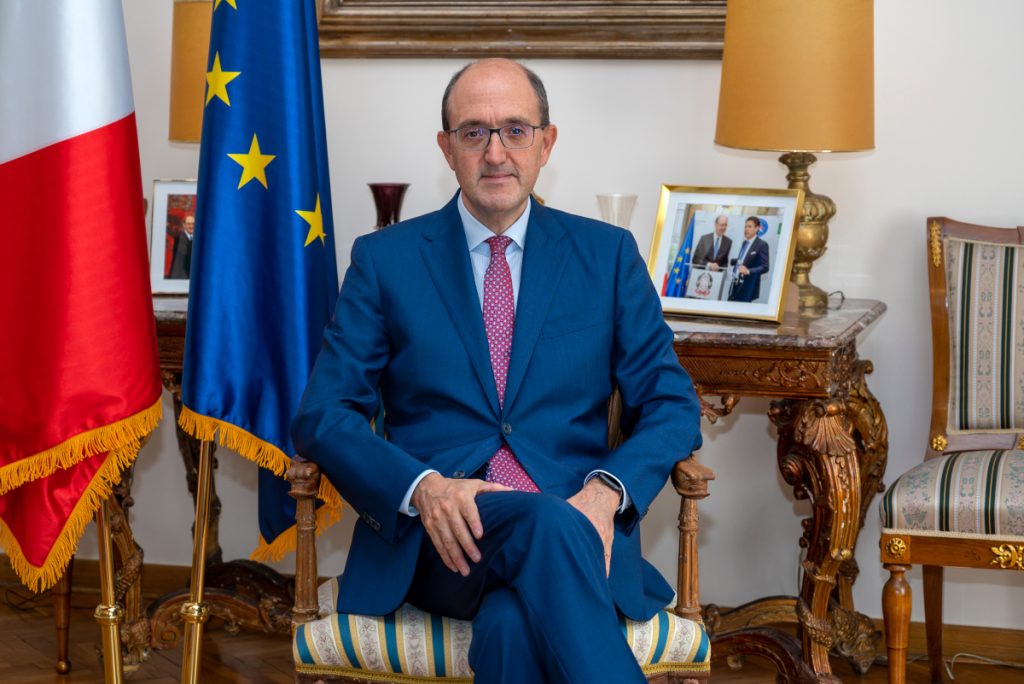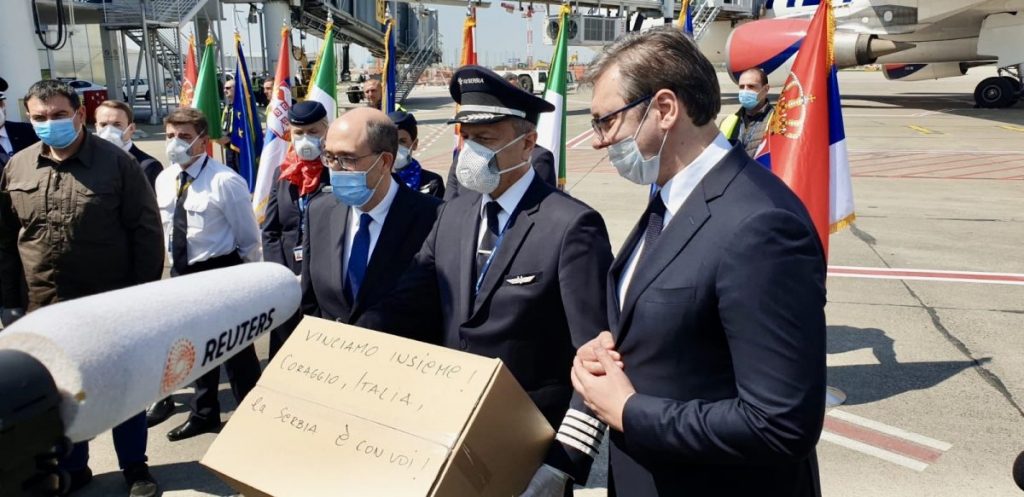We still have to face a certain degree of uncertainty in the next months, but many activities have restarted once again.
H.E. Carlo Lo Cascio, the Italian ambassador to Serbia, talks about this year, the coronary virus pandemic, how satisfied he is with the current relations between Serbia and Italy and many other things.

This year was very difficult for Serbia and Italy. How do you see our relationship in it?
2020 began with the successful visit of our Minister of Foreign Affairs Luigi Di Maio to Belgrade. It was a very significant moment for our friendship, and it gave continuity to the practice of high-level bilateral meetings, in the wake of the visit of our Prime Minister Giuseppe Conte and other Cabinet Ministers last year. In December, for instance, also our Minister for European Integration Vincenzo Amendola was here, reiterating our convincing support for the Serbian path towards EU accession. In addition to that, the Minister of Foreign Affairs Ivica Dacic was in Rome in June to meet Minister Di Maio. We can proudly say that the Italian-Serbian “special relationship” is stronger than ever and it was further reinforced even during the global crisis caused by a coronavirus.
In difficult times, we helped each other. How important is this to you?
In April Serbia donated to Italy a large amount of sanitary material, that was sent from Belgrade to Rome on seven different aircrafts. This was a very generous donation which helped us in a very concrete way during one of the worst moments of the Covid19 crisis. We were very grateful to Belgrade and we wanted to do something to reciprocate that gesture. Therefore, at the beginning of August, during the new peak of cases here, the Italian Government decided to send to Serbia an Italian medical team made of several specialized doctors, with the idea to share our experience and our knowledge in the fight against coronavirus. Thanks to the support of the Ministry of Health, our doctors visited all the main clinical centers of Serbia, with the aim of exchanging advice with local sanitary staff and sharing the lessons learned in dealing with many infected patients in Italy. It was a very useful experience for both sides and I’m pleased to say the Italian medical team was very much impressed by the competences and efficiency of their Serbian colleagues. I think it was incredibly meaningful that we were able to help each other. I was also personally moved by the solidarity expressed both by ordinary citizens and Authorities. We got hundreds and hundreds of messages of affection and hope during the hardest months in Italy. I will never forget that.
The EU acknowledged that it did not help Italy in time. What lesson did Italy learn from that? What do you think about the establishment of a Recovery Fund to help member countries affected by the virus?
At first, when the number of coronavirus contagions in Northern Italy grew abruptly, it looked like no one could really foresee what was about to happen in the rest of Europe. Italy was among the first heavily hit countries in the Western Hemisphere and the sanitary crisis that followed was very tough. However, Italian citizens reacted with diligence, solidarity and sense of unity to the tragic happenings and a new spirit of national pride emerged. During the summer, after a long negotiation, the European Council approved the Commission’s proposal for an ambitious Recovery Plan. It was a historical and appropriate decision, which took in full in consideration the ideas that Italy had put forward. A clear signal was given then to all the EU citizens, businesses and financial markets: Europe was reacting in a meaningful, timely and determined way to the crisis. As our Prime Minister Conte said, the European Union embraced a different perspective in favor of a more cohesive and more inclusive Europe, closer to the citizens and ultimately more “political”. In other words, an approach more consistent both with the original spirit of the European dream and with the unprecedented challenge posed by COVID19. This is what Italy was looking for and I think that we are very satisfied with what we have achieved.

What does our cooperation look like after the whole situation with the coronavirus?
Our cooperation never stopped, also thanks to the common initiatives taken to combat the epidemic. We still have to face a certain degree of uncertainty in the next months, but many activities have restarted once again. We are waiting for the formation of the new Serbian Government, after which we will be able to resume the well-established practice of high-level bilateral visits. In the meantime, we continue doing what we do better: political contacts, economic cooperation and trade, cultural events.
What impact did this whole situation have on the economy?
Unfortunately, there were negative consequences everywhere. Many countries were severely “hit by the storm” also from an economic point of view. We experienced an unprecedented crisis and now we all have to start building our recovery. The European plan, called “Next Generation EU”, is a new recovery instrument of €750 billion, which will boost the EU budget with new financing raised on the financial markets. Italy is already defining ambitious projects to boost growth and private investment that we plan to realize thanks to EU funding. At the same time, Serbia will continue to be a beneficiary of EU grants, mainly through the Pre-accession instruments, in the new multiannual financial framework. Moreover, the Serbian economy has proved to be very resilient and is already partially recovering. It is a good sign that gives us hope for the last part of the year.
“This crisis showed how strong and stable is the economic relation between Italy and Serbia”
Italians are one of the largest investors in Serbia. How safe are these investments in this period?
This crisis showed how strong and stable is the economic relation between Italy and Serbia. As I always say: we are here to stay. Although there were some negative consequences and the bilateral trade slightly diminished, Italy is still among the first investors in Serbia and the second economic partner. Considering the current circumstances, I think that this is an excellent result, made possible by the persisting commitment of both countries and – above all – by the tireless activity of many private operators. I’m also very impressed by the “resilience” of the Serbian economy to the current crisis. The financial measures taken by the Government proved to be very helpful to several companies. Our goal should now be not only to bring the level of our cooperation “back to normal”, but also to further promote common economic initiatives. In 2018 we reached a record 4 billion euros bilateral trade. I am sure that we have all the elements needed to break this record very soon. Serbia and the entire Western Balkans are going through a phase of profound transformation. Economic growth is undoubtedly a big part of it.
What lessons will the world learn from this situation with the coronavirus?
The Covid19 pandemic has affected the entire world, it has deeply shaken the lives of millions of people, it’s still having a significant impact on societies and economies, forcing us to reconsider, in a sudden way, prospects and models of development. The world must learn from this terrible experience and one could say that in Europe we already did so. We understood that more solidarity is needed among all current and the future Member States. We are also evolving towards a more digitalized society. Last but not least, we have to start investing in a more sustainable way and implement a true ecological transition. These are to core principles that the EU is trying to push both at the internal and at the global level. Italy strongly adheres to them.
“Serbia and the entire Western Balkans are going through a phase of profound transformation”
What are your expectations in the coming period? Do you think we will get the vaccine soon?
I really hope we will be able to get the vaccine soon and stop the pandemic. Italy is directly contributing to the global research effort and the EU has already pulled an incredible amount of financial resources with the goal of creating a vaccine as quickly as possible. In the meantime, our communities should continue to face the situation with patience and resilience, while Governments should act responsibly and take action to prevent the spreading of the disease. Together we will make it.